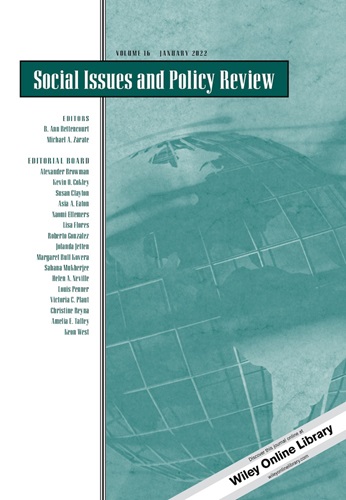Mixed Signals: The Unintended Effects of Diversity Initiatives
IF 5.6
1区 心理学
Q1 PSYCHOLOGY, SOCIAL
引用次数: 85
Abstract
Organizational diversity initiatives—programs and policies intended to increase the fairness of organizations and promote the inclusion, hiring, retention, and promotion of underrepresented groups—are ubiquitous. Despite the widespread implementation of diversity initiatives, several empirical investigations point to challenges associated with these initiatives. We suggest that one of the challenges hindering the effectiveness of diversity management involves the unintended signals that these initiatives send. Specifically, we review social psychological evidence that the mere presence of diversity initiatives can have unintended consequences through the communication of (1) fairness signals, (2) inclusion signals, and (3) competence signals. The presence of organizational diversity initiatives may lead to a presumption of fairness for underrepresented groups, making discrimination harder to identify and litigate. Conversely, these initiatives may lead to a presumption of unfairness for members of overrepresented groups, increasing the likelihood that traditionally advantaged groups will perceive themselves as victims of discrimination. The presence of diversity initiatives may increase the attractiveness of organizations to underrepresented groups who anticipate inclusion, but increase felt exclusion and threat among overrepresented groups. Finally, the presence of diversity initiatives may signal that underrepresented groups need help to succeed and are thus less competent than their advantaged counterparts. Researchers and practitioners should note the potential unintended混杂的信号:多样性倡议的意外影响
组织的多样性倡议——旨在增加组织的公平性,促进对代表性不足群体的包容、雇佣、保留和提升的计划和政策——无处不在。尽管多样性倡议得到了广泛实施,但一些实证调查指出了与这些倡议相关的挑战。我们认为,阻碍多样性管理有效性的挑战之一涉及这些举措发出的意想不到的信号。具体而言,我们回顾了社会心理学证据,表明多样性倡议的存在可以通过(1)公平信号、(2)包容信号和(3)能力信号的传播产生意想不到的后果。组织多样性倡议的存在可能导致对代表性不足群体的公平推定,使歧视更难识别和提起诉讼。相反,这些举措可能会导致对代表人数过多的群体成员的不公平推定,从而增加传统上享有优势的群体将自己视为歧视受害者的可能性。多样性倡议的存在可能会增加组织对那些期望被包容的代表性不足的群体的吸引力,但会增加对代表性过高的群体的排斥和威胁。最后,多样性倡议的存在可能表明,代表性不足的群体需要帮助才能成功,因此他们的能力不如优势群体。研究人员和从业人员应注意潜在的意外
本文章由计算机程序翻译,如有差异,请以英文原文为准。
求助全文
约1分钟内获得全文
求助全文
来源期刊

Social Issues and Policy Review
Multiple-
CiteScore
22.20
自引率
1.10%
发文量
9
期刊介绍:
The mission of Social Issues and Policy Review (SIPR) is to provide state of the art and timely theoretical and empirical reviews of topics and programs of research that are directly relevant to understanding and addressing social issues and public policy.Papers will be accessible and relevant to a broad audience and will normally be based on a program of research. Works in SIPR will represent perspectives directly relevant to the psychological study of social issues and public policy. Contributions are expected to be review papers that present a strong scholarly foundation and consider how research and theory can inform social issues and policy or articulate the implication of social issues and public policy for theory and research.
 求助内容:
求助内容: 应助结果提醒方式:
应助结果提醒方式:


